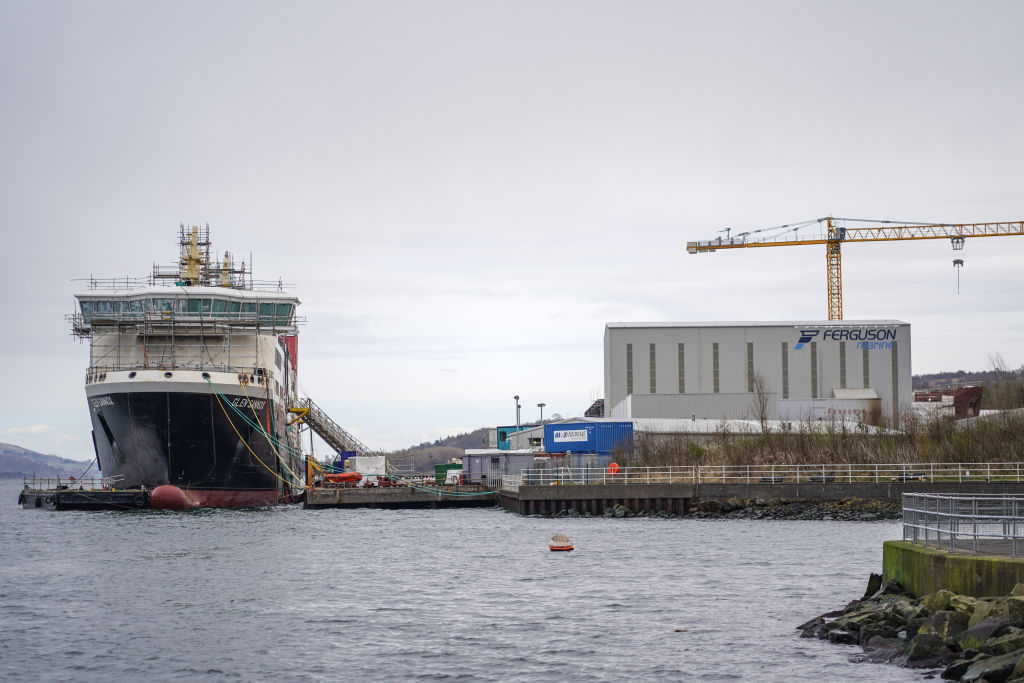In an extraordinary admission this week, the Scottish government has vowed to continue funding the SNP’s ferries fiasco — despite accepting it would be cheaper to scrap the second vessel and commission a new one from scratch.
Economy secretary Neil Gray said a review had found that finishing the second boat, known as Hull 802, does not represent value for money. What’s the background? The Scottish government commissioned two new vessels to serve on Scotland’s west coast in 2015. None have been delivered by the now nationalised Glasgow shipyard that won the contract, while funding for the yard has become something of a financial blackhole for taxpayers. Meanwhile Scottish islanders have at times been left literally stranded as the ‘lifeline’ connections they rely on to the mainland have failed.
The ships are more than £200 million over budget and six years late, with the yard now estimating the first boat, the Glen Sannox, will be delivered this autumn, while completion of Hull 802 is expected in late summer 2024.
It seems the Scottish civil service is now, belatedly, starting do its job properly on ferries procurement. But it’s too little too late for Scotland’s beleaguered islanders.
In a statement to the Scottish parliament, Gray said the review found that the value for money case for completing the Glen Sannox has been met. ‘However, the case for vessel 802 is more challenging, and I have accepted the judgement of the Scottish government accountable officer that the narrow value for money case has not been made,’ said Gray.
He went on to say he accepts that ‘the pure value for money assessment concludes that it could be cheaper to re-procure a new vessel’, adding that if a new vessel were commissioned then it would not come into service until at least May 2027.
Missing from the statement was any form of apology to the islanders whose lives and livelihoods are being so badly impacted by the fiasco. Gray’s statement was formulated using the SNP’s usual mix of platitudes and hubris. He talked about the Scottish government aiming to provide ‘sustainable, high quality lifeline services to our island communities’ without ever admitting that it has fully failed to do this.
As Willie Rennie, former leader of the Scottish Liberal Democrats, said in the chamber of the Scottish parliament, there has been no accountability for the ferries disaster:
We’ve had eight years of this utter fiasco, which the government has soaked the taxpayer, has betrayed the islanders and has utterly humiliated the workers, yet we’ve had six ministers in that time. Not one single one of them, including the current first minister, has lost his job for this fiasco.
Gray’s reference to the ‘Scottish government accountable officer’ relates to the convention by which a civil service representative is officially responsible for releasing government funds and must be in a position to tell auditors that spending provides value for money. Following the performance review on the progress of the boats, Gregor Irwin, the Scottish government’s director general for the economy, formally wrote to Gray stating he requires written permission to override the rule for Hull 802.
It is notable that this is one of the very few times that the civil service in Scotland has requested a ‘ministerial direction’, which in this case means the minister is forced to take on responsibility for the use of public money. It is also notable that when the contract for the ferries was put in place in 2015 (a contract now subject to allegations of being rigged), it was done despite the shipbuilder’s inability to provide mandatory refund guarantees — yet the Scottish civil service at that point did not ask for a ministerial direction.
There have been mutterings over the years that Scotland’s civil service is too close to its SNP political bosses, to the point where normal British civil service standards might not be being adhered to. It seems the Scottish civil service is now, belatedly, starting do its job properly on ferries procurement. But it’s too little too late for Scotland’s beleaguered islanders.
In a TV interview following his statement to parliament, a flustered Gray could not guarantee when the new ferries will finally start serving island communities. He also could not guarantee what the final cost would be. ‘There are risks and possibilities that those numbers go higher,’ he said. None of this is reassuring for taxpayers or for desperate islanders.







Comments